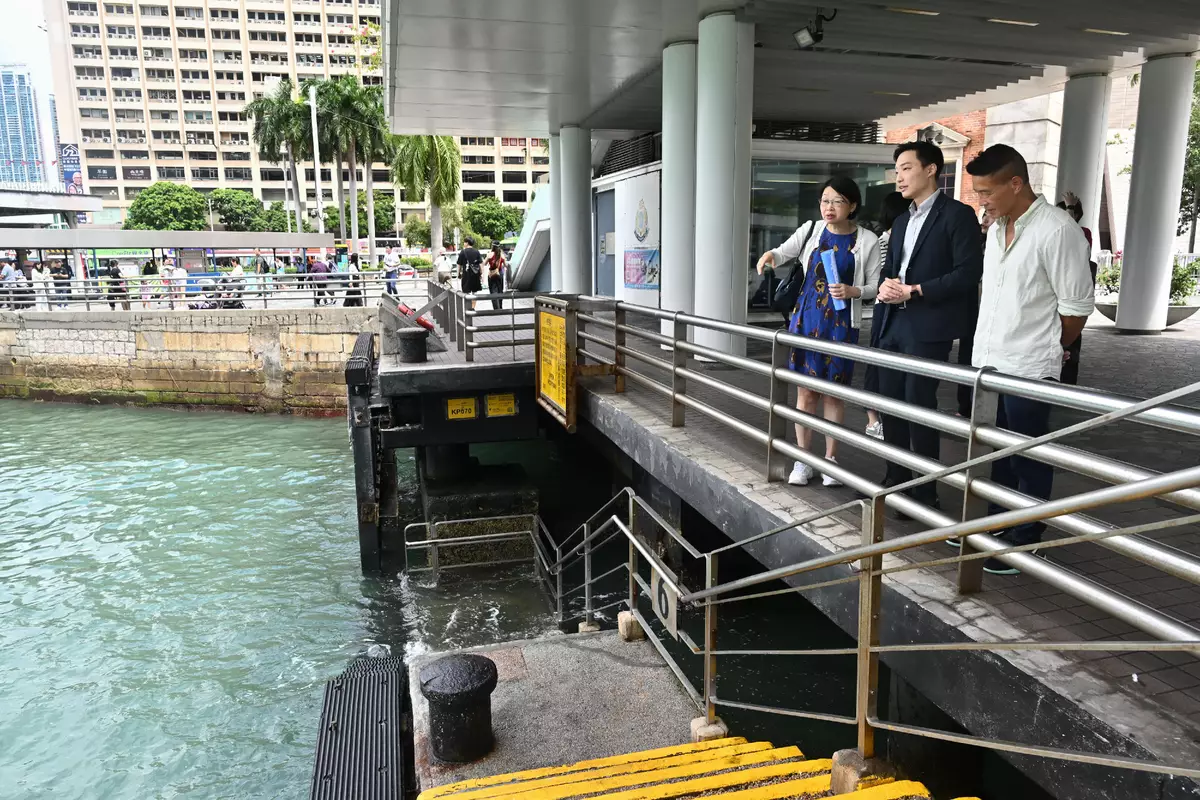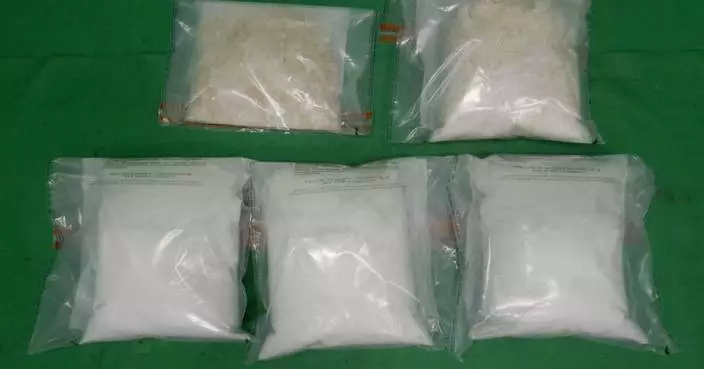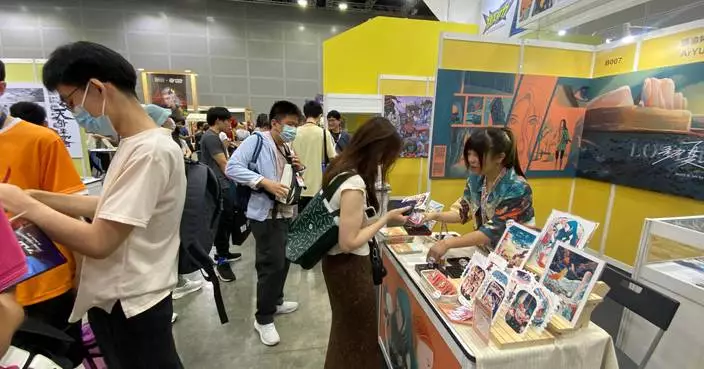CSTB co-ordinates measures in relation to arrival of visitors to Hong Kong during Mainland's National Day Golden Week
Following the first interdepartmental meeting held on August 23 to co-ordinate the preparation work for the arrival of visitors to Hong Kong during the Mainland's National Day Golden Week, the Culture, Sports and Tourism Bureau convened another meeting today (September 20) to follow up on the preparation work carried out by various departments, including crowd-control management of visitors, etc, said a Government spokesman. The meeting was chaired by the Secretary for Culture, Sports and Tourism, Mr Kevin Yeung, with representatives from government departments including the Hong Kong Customs (Customs), the Hong Kong Police Force (Police), the Immigration Department (ImmD), the Transport Department, various District Offices, etc. Representatives from various tourism-related organisations including the Travel Industry Authority (TIA), the Hong Kong Tourism Board (HKTB), the Travel Industry Council of Hong Kong, the West Kowloon Cultural District Authority, major tourist attractions, the hotel industry, etc, also attended. Relevant parties will continue to maintain close communication on the crowd control of visitors during the Mainland's National Day Golden Week with a view to preparing in advance and co-ordinating different aspects for receiving visitor arrivals to Hong Kong.
Mr Yeung said, "The HKSARG has been closely monitoring visitor arrivals during the Mainland's National Day Golden Week and will continue to maintain close liaison with various government departments, relevant organisations and the trade to properly manage visitor flows, so as to offer visitors with a good travel experience and a taste of Hong Kong's city charm of 'Tourism is everywhere in Hong Kong'."
During the Mainland's National Day Golden Week, relevant government departments will strengthen manpower as well as co-ordination of transport and cross-boundary services at various control points, including strengthening crowd management, increasing transport frequency, etc. If necessary, the Police will make appropriate traffic arrangements according to the actual circumstances, including arranging public transport to use the designated dedicated lane at San Sham Road to travel to Lok Ma Chau/Huanggang Port. In addition, the Inter-departmental Joint Command Centre set up by Customs, the Police, the ImmD and other departments will be activated during the Mainland's National Day Golden Week to monitor the situation at each land control point, as well as to maintain close liaison with Mainland counterparts and take contingency actions where necessary. The Emergency Transport Co-ordination Centre of the Transport Department will operate 24 hours to monitor the traffic conditions of different districts, including various boundary control points and major stations, disseminate the latest traffic information through various channels and implement response measures where appropriate.
Various District Offices will closely monitor the flow of visitors within their corresponding districts during the Mainland's National Day Golden Week and strengthen management of the relevant spots having regard to the actual circumstances. Major tourist attractions will also put in place crowd control measures.
The TIA has been reminding travel agents receiving relevant Mainland inbound tour groups to stagger arrival times as far as possible and urge travel agents, shops, restaurants, etc, receiving Mainland inbound tour groups to implement appropriate measures for managing the order of visitors and coaches. The TIA will also deploy additional manpower during the Mainland's National Day Golden Week to conduct inspections in districts where relatively more registered shops for inbound tour groups are located, and offer assistance to visitors and tourist guides to protect the rights of inbound tour group visitors. In addition, Customs will step up inspections of shops serving visitors to combat unfair trade practices.
The Tourism Commission, together with representatives from various government departments and the TIA, visited Tsim Sha Tsui Star Ferry Pier and the nearby piers offering Victoria Harbour tours earlier (September 9) to inspect enhancement arrangements of crowd control deployed by relevant parties, as well as visiting the Kowloon City District to inspect registered shops and catering premises for Mainland inbound tour groups to remind the relevant parties to better prepare for the co-ordination work for crowd management. In addition, the Tourism Commission has been maintaining liaison with Mainland tourism authorities and communicating with them on the arrival of Mainland visitors. It has provided the hotlines of the relevant local organisations to Mainland inbound group visitors via the Mainland tourism authorities.
At present, the ImmD will upload the daily arrival figures of each control point to its website (www.immd.gov.hk). In addition, visitors may check the estimated waiting time at each land boundary control point via the Immigration mobile application.
During the Mainland's National Day Golden Week, in case of emergency, Mainland inbound tour group visitors, tour escorts accompanying the tour groups and local tourist guides may seek assistance from the TIA by calling its service hotline 3698 5900 (operating from 9am to 6pm from October 1 to 7). For enquiries or complaints, visitors may call the HKTB's hotline 2508 1234 (operating from 9am to 8pm from October 1 to 7) or the Consumer Council's hotline 2929 2222 (operating from 9am to 5.30pm from October 2 to 4 and on October 7).

CSTB co-ordinates measures in relation to arrival of visitors to Hong Kong during Mainland's National Day Golden Week Source: HKSAR Government Press Releases

CSTB co-ordinates measures in relation to arrival of visitors to Hong Kong during Mainland's National Day Golden Week Source: HKSAR Government Press Releases
CHP reminds public on precautions against cold weather
The Centre for Health Protection (CHP) of the Department of Health (DH) today (December 22) reminded the public, particularly the elderly and people with chronic illnesses, to adopt appropriate measures to protect their health in view of the cold weather.
A spokesman for the CHP said that cold weather can easily trigger or exacerbate diseases, especially among the elderly and persons suffering from heart disease, respiratory illnesses or other chronic illnesses.
"Elderly people have less insulating fat beneath their skin to keep them warm, and their body temperature control mechanisms may be weaker. Their body may not be able to appropriately respond to thecold weather," the spokesman said.
Some senior persons may have decreased mobility, which can impair their ability to generate and conserve body heat. Chronic illnesses, such as hypertension, diabetes and endocrine disorders, may undermine the health of elderly people and lower their metabolic rate, subsequently causing their body to generate less heat. Persons with chronic illnesses, such as chronic respiratory illnesses or heart disease, are vulnerable to disease aggravation due to cold weather.
The CHP reminded the public, in particular the elderly and persons with chronic illnesses, to adopt the following preventive measures:
Take note of the weather forecast. Wear warm clothing, including hats, scarves, gloves and socks, accordingly;
Consume sufficient food to ensure adequate calorie intake;
Perform regular exercise to facilitate blood circulation and heat production;
Stay in a warm environment and avoid prolonged outdoor exposure;
Use heaters with care and maintain adequate indoor ventilation; and
Seek medical advice if feeling unwell.
In addition, the public should avoid alcoholic beverages.
"Drinking alcohol cannot keep you warm. Alcohol accelerates the loss of body heat through dilated blood vessels, resulting in chilling instead," the spokesman said.
"Parents should ensure that babies are sufficiently warm, but it is also important to keep babies relatively lightly clothed to avoid overheating them," the spokesman added.
Parents should observe the following safety measures when putting their children to bed:
Keep the room well ventilated and at a comfortable temperature;
Always place babies on their backs to sleep. Leave their heads, faces and arms uncovered during sleep;
Babies do not need pillows. Place babies on a firm and well-fitted mattress to sleep. Avoid soft objects, pillows and loose bedding;
Let babies sleep in a cot placed near their parents' bed; and
Maintain a smoke-free environment.
In addition, many respiratory pathogens, including influenza and SARS-CoV-2, may have increasing activity and community transmission during winter. Seasonal influenza vaccination is recommended for all persons aged 6 months or above, except those with known contraindications. Persons at higher risk of getting influenza and its complications, including the elderly and children, should receive seasonal influenza vaccinations early. Please see details of the vaccination schemes on theCHP's website.
A person who gets influenza and COVID-19 at the same time may be more seriously ill and would have a higher risk of death. It is important for elderly persons, especially those residing in residential care homes, to receive both a seasonal influenza vaccination and a COVID-19 vaccination. They should also receive an additional booster against COVID-19 according to recommendations as soon as possible. The public should also maintain good personal and environmental hygiene against respiratory illnesses and note the following:
Surgical masks can prevent transmission of respiratory viruses from ill persons. It is essential for persons who are symptomatic (even if having mild symptoms) to wear a surgical mask;
Wear a surgical mask when taking public transport or staying in crowded places. It is important to wear a mask properly, including performing hand hygiene before wearing and after removing a mask;
Avoid touching one's eyes, mouth and nose;
Wash hands with liquid soap and water properly whenever possibly contaminated;
When hands are not visibly soiled, clean them with 70 to 80 per cent alcohol-based handrub;
Cover the mouth and nose with tissue paper when sneezing or coughing. Dispose of soiled tissue paper properly into a lidded rubbish bin and wash hands thoroughly afterwards;
Maintain good indoor ventilation;
When having respiratory symptoms, wear a surgical mask, refrain from work or attending classes at school, avoid going to crowded places and seek medical advice promptly; and
Maintain a balanced diet, exercise regularly, take adequate rest, do not smoke and avoid overstress.
Food-borne diseases, particularly those linked to hotpot cuisine, are also common in cold weather. The following preventive measures should be taken:
Wash hands before handling and consuming food;
Do not patronise unlicensed vendors or those with poor hygienic standards while selecting food;
Wash and cook all food thoroughly;
Vegetables should be washed thoroughly in clean running water before cooking and consumption. When appropriate, scrub vegetables with hard surfaces with a clean brush to remove dirt and substances, including pesticide residues and contaminants, from surfaces and crevices;
Shrimps should be fully cooked until the shells turn red and the flesh turns white and opaque;
For shellfish such as scallops and geoduck, scrub the shells thoroughly and remove internal organs;
Do not eat any undercooked freshwater aquatic products. To ensure that the food is thoroughly cooked, the centre of the food should reach a temperature of at least 75 degrees Celsius so as to destroy pathogen;
Most hotpot ingredients should be stored in a refrigerator at 4 degrees C or below, while frozen food should be stored in a freezer at -18 degrees C or below;
Never use raw eggs as a dipping sauce for hotpot; and
Use different sets of chopsticks to handle raw and cooked food to avoid cross-contamination.
In addition, when using fuel-burning appliances, especially in indoor areas, the public should ensure adequate ventilation to avoid harmful exposure to carbon monoxide (CO) and prevent CO poisoning.
For more health information, the public may call the DH's Health Education Infoline (2833 0111) or visit theCHP's websiteandFacebook Fanpage.
The public may also call Dial-a-Weather (1878 200) or visit thewebsite of the Hong Kong Observatoryfor the latest weather information and forecasts, or itspage on Weather Information for Senior Citizens.










